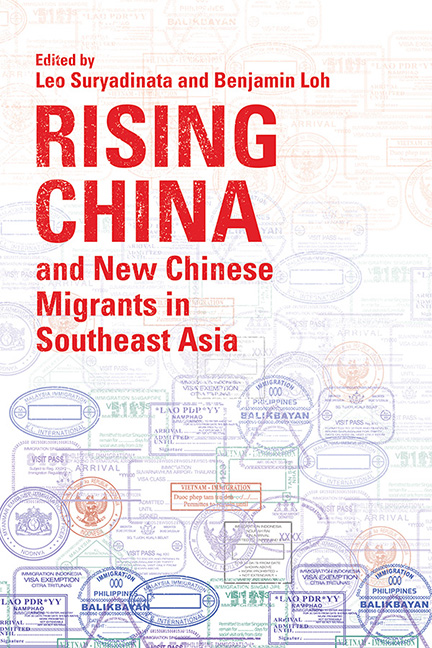Book contents
- Frontmatter
- Contents
- About the Contributors
- Introduction: Rising China and New Chinese Migrants in Southeast Asia
- Part I General Overviews on Rising China and Xin Yimin
- Part II China’s Soft Power, Xin Yimin and Local Communities
- Part III New Chinese Migrants and Local Communities
- Part IV New Chinese Migrants and Local Economies
- Index
5 - China’s Soft Power and the Chinese Overseas: Case Study of Xiamen University and the Confucius Institute in Malaysia
Published online by Cambridge University Press: 09 January 2024
- Frontmatter
- Contents
- About the Contributors
- Introduction: Rising China and New Chinese Migrants in Southeast Asia
- Part I General Overviews on Rising China and Xin Yimin
- Part II China’s Soft Power, Xin Yimin and Local Communities
- Part III New Chinese Migrants and Local Communities
- Part IV New Chinese Migrants and Local Economies
- Index
Summary
Locked in a tense geopolitical tussle, China and the United States have expanded their bitter rivalry into the soft power arena. In Malaysia, China’s increased presence is felt across the board: from trade investment and manufacturing to e-commerce and the digital economy. One of China’s recent initiatives to stand out has been the establishment of Xiamen University in Malaysia (XMUM), marking a milestone in education cooperation between the two countries. This chapter is a study of the XMUM project. It will look at the effect of China’s education outreach and examine the potential role of the overseas Chinese in shaping XMUM’s imprint on Malaysia and the wider region.
To set the context, the chapter begins with an overview of the soft power competition between China and the United States. Next is a review of the Sino-Malaysia relationship and the Chinese soft power projection in Malaysia. This is followed by a descriptive report on two key Chinese education projects in Malaysia; namely, the Confucius Institute (CI) at the University of Malaysia and the Xiamen University branch campus at Sepang.
The third part of the chapter will then develop three sets of evaluative arguments highlighting the XMUM’s importance and potential. The first will draw attention to XMUM’s broader significance beyond Malaysia; namely, China’s foray into the critical soft power arena—international higher education. The Xiamen move, I argue, signifies Beijing’s wider ambition to exert sway in this strategically vital sphere of influence that is still largely dominated by the West.
The chapter then makes the case that XMUM may also be transformed by its relocation to Malaysia. By moving out of the mainland, it could acquire features enabling the university to assume a wider role. One of these agents of change is the overseas Chinese factor. With a campus in Malaysia, Xiamen University is in fact returning to its Southeast Asia roots. Over time, XMUM is likely to re-embrace Malaysia’s multiculturalism and recapture the overseas Chinese traditional intermediary role. Transforming itself from a mere conduit of China soft power into a go-between institution, a two-way bridge linking China and Malaysia.
- Type
- Chapter
- Information
- Rising China and New Chinese Migrants in Southeast Asia , pp. 91 - 106Publisher: ISEAS–Yusof Ishak InstitutePrint publication year: 2022

